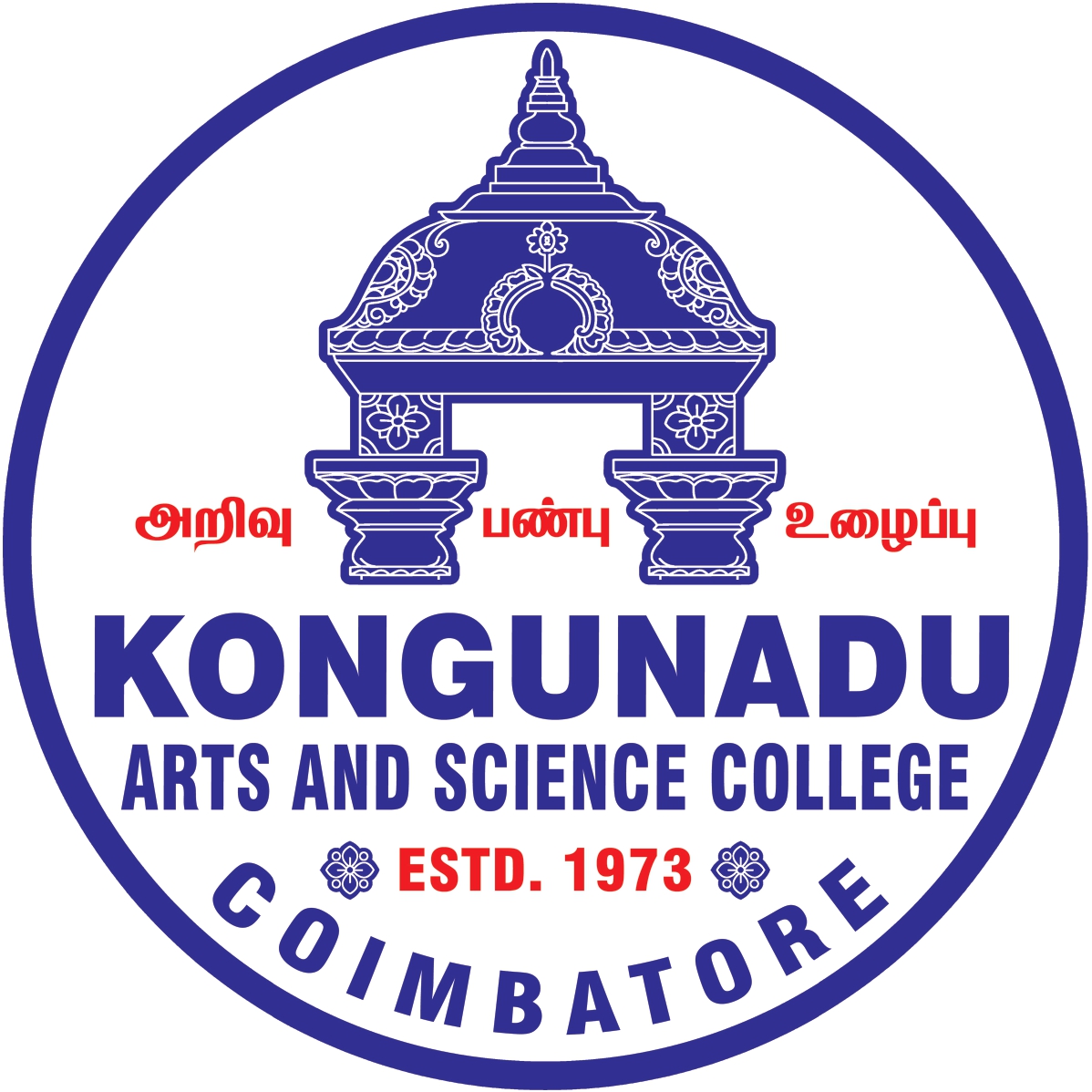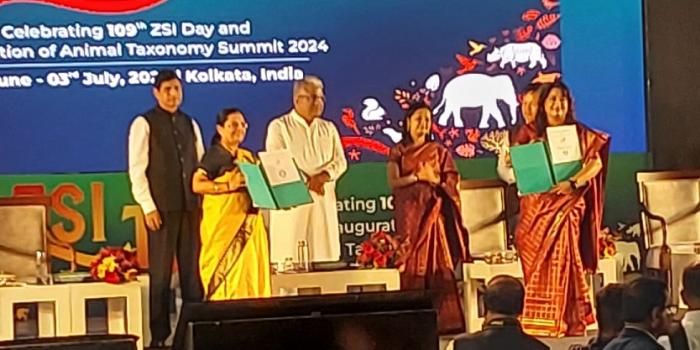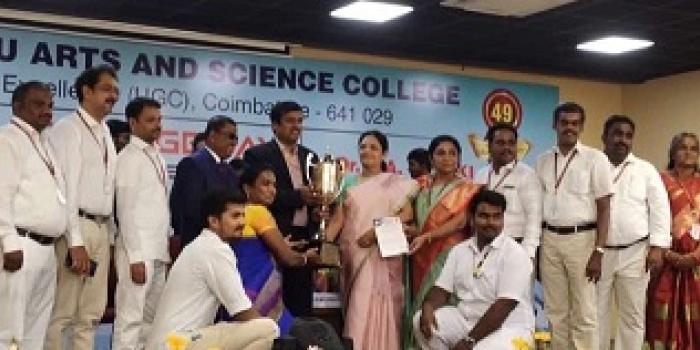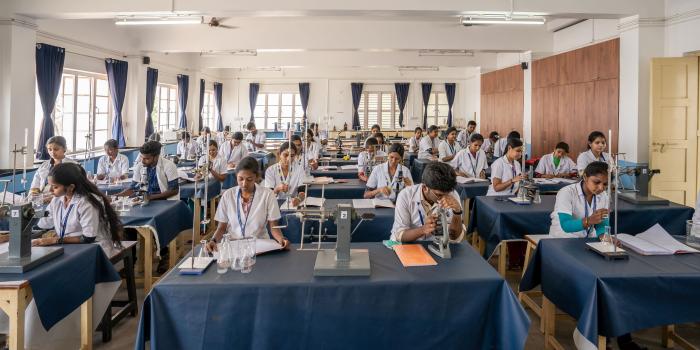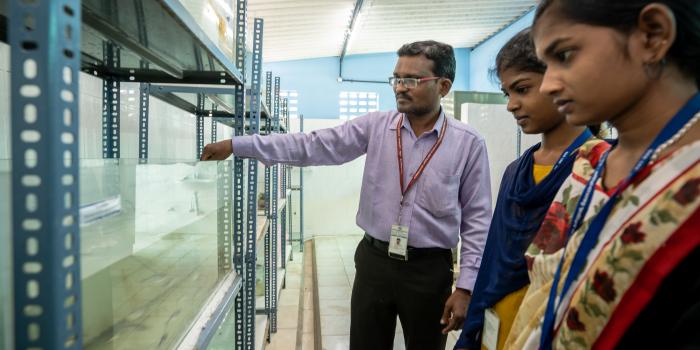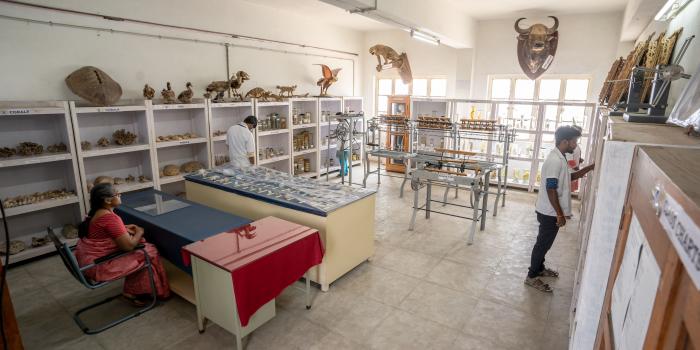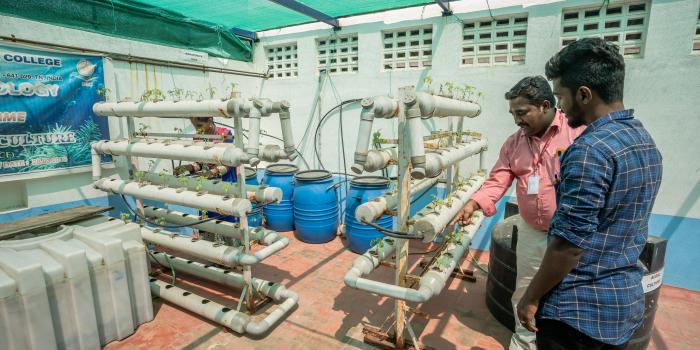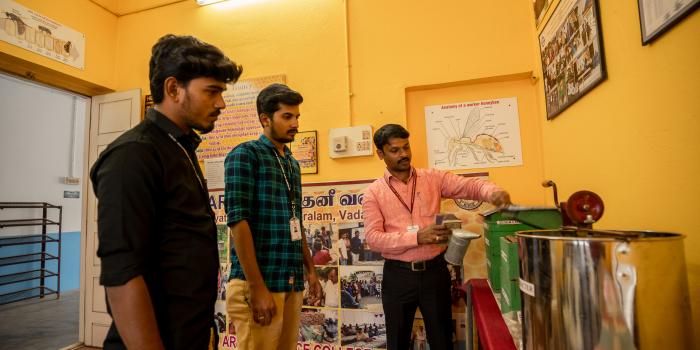- B.Sc Zoology
-
Eligibility :
A candidate must have passed Class +2 with Physics, Chemistry, Biology/Botany and Zoology
Duration : 3 Years
Strength : 50
Educational Objectives :
Students will learn Scientific Classification of Animal kingdom and fundamentals in Zoology during first two years. They will be introduced frontiers areas such as Biotechnology, Biochemistry, Biophysics and Biostatistics and Bioinformatics etc. Apart from regular courses they will be offered extra departmental courses and job oriented courses like Sericulture, Apiculture,Ornamental fish production and trade etc. Along with their regular courses, students will be given projects by that they can have collaboration with other institutions and industries in Coimbatore and across India.
Program Specific Outcomes :
- To gain complete knowledge of Zoology as well as allied biological sciences and able to classify the chordates and non-chordates based on their morphology, anatomy and systemic organisation
- Students will be enriched their knowledge to the level of define and explain the major concepts in animal sciences and describe the ecological, medical and economic significance of animals in day to day life of humans.
- Students will be able to use the instruments, Biostatistical and Bioinformatics tools and other laboratory techniques in the proper way and able to explain how the animals function at the level of the cell, tissue, organ, gene and genome.
- Skill enhancement courses like aquaculture, sericulture and apiculture and other courses will inculcate the skills which will help them to start their own venture and to generate self-employment to make them be successful entrepreneurs.
- Students will be placed as Animal behaviourist, conservationist, Zoo curator, Wild life educator, Zoology faculty, Forensic experts, Lab technician, Veterinarians, Wildlife biologist etc.
Program Outcomes :
- To develop scientific attitudes, which will in turn beneficial for the society because the scientific development makes the growth of the nation or society to a greater height.
- To equip students to learn the different biological systems, their coordination and control.
- To learn the behaviour, biological role and evolution of the animal in the ecosystem.
- To familiarise the qualitative and quantitative analysis of parameters using various statistical and bioinformatics used in modern sciences.
- This program is providing the platform for understanding classical genetics, cells and Biotechniques.
- The programme will equip the students to serve in aquaculture, apiary industries or develop their own industrial units.
- Theoretical and practical skills gained will be highly helpful to design the different public health strategies for social welfare.
- To provide in-depth knowledge of applied subjects which will ensure the inculcation of employment skills so that they can make a career and become an entrepreneur.
- M.Sc Zoology
-
Eligibility :
A candidate who have passed B. Sc. Zoology degree examination
Duration : 2 Years
Strength : 20
Educational Objectives :
They will be exposed in detail to advance and modern biological sciences and they will be introduced to the basics of research and trained on how to design experiments, data analysis and writing a manuscript. Their project work will be published in reputed journals in the field, by that, they can avail job and research opportunities at both national and international level. They will be aware about the competitive exams. At last, when they wind up the course, they will be excelled in theory as well as hands on experience in state – of – art techniques to be competitive.
Program Specific Outcomes :
- Students will be able to clearly explain about the basic and advanced concepts in Zoology and relevant subjects and identify, classify and differentiate the different phyla of the invertebrata and chordata.
- The learned concepts and techniques in various subjects will provide an extra edge to our students who wish to undertake higher studies.
- Understand the complexity of life processes, their molecular, cellular and physiological processes, their genetics, evolution and behaviour and their interrelationships with the environment
- The procedural knowledge about identifying and classifying animals will provide them for the professional advantages in teaching, research and taxonomist job in various government organizations including Zoological survey of India and National parks Sanctuaries.
- Students will be able to access the primary literature, identify relevant works for a particular topic and evaluate the scientific content of the works.
Program Outcomes :
- The programme creates the scientific attitudes among young minds which inturn prove to be beneficial for the society.
- Students will be enriched with the knowledge on different group of animals, evolution, genetics and behaviour of animals.
- Students will be familiarise with the concept in Cell biology, Physiology, Entomology and role of humans and animals in the ecosystem.
- They will be able to qualitatively and quantitatively analyse the biological parameters using various statistical and bioinformatics and computational tools.
- Students will be given ample opportunities to explore different career avenues.
- Theoretical and practical knowledge gained through this programme will be helpful in designing Entrepreneurial opportunities for social welfare.
- Understand the immune mechanisms in disease control, vaccination, process of immune interactions
- The program has been designed to avail in depth knowledge on allied subjects also which will make students to equip them with employment skills.
- Students will find opportunities in government departments, environmental agencies, universities, colleges, environmental/ecological fields.
- M.Phil Zoology
-
Eligibility :
A candidate who have passed M. Sc. degree examination with Zoology
Duration :
- Full Time -1 Year
- Part Time - 2 Years
Strength :
- Full Time - 20
- Part Time - 20
Educational Objectives :
Program Specific Outcomes :
Program Outcomes :
- Ph.D Zoology
-
Eligibility :
A candidate who have passed M. Sc. degree examination with Zoology
Duration :
- Full Time - 3 Years
- Part Time - 5 Years
Strength :
- Full Time - 20
- Part Time - 20
Educational Objectives :
Program Specific Outcomes :
Program Outcomes :
- Diploma in Apiculture
-
Eligibility :
plus 2 pass
Duration : 1 year
Strength : 50
Educational Objectives :
The programme is intended to provide scientific knowledge and technical skills in the all aspects of beekeeping. The knowledge imparted by the students through this programme shall facilitate for improved productivity.
Program Specific Outcomes :
- Get acquainted with the role of bees in Pollination of crops and their Importance in increasing crop productivity
- Understand the difference between traditional and modern bee- Keeping systems
- Describe bee biology and anatomy from the perspective of managing bees
- Familiarize about the selection of place for hive installation
- Practice the disease preventive measures/ disease management
Program Outcomes :
- To get familiar about the tools and equipment needed for beekeeping
- To understand the biology of bees and their behavior, types of bees and its life cycle
- Acquire knowledge on Handling bee keeping systems, installation of hives and the tools
- Apply the learned skill for understanding the bee hive, colony, diseases in beehive
- Enriched knowledge on harvest, process and market the products and by-products of beekeeping Discover the principles of sustainable beekeeping and how these principles will guide the beekeeping into an enduring practice.
- Diploma in Ornamental Fish Prod
-
Eligibility :
Plus 2 pass
Duration : 1 Years
Strength : 50
Educational Objectives :
This course provides an opportunity to gain knowledge on production and trading of the various ornamental fishes and their economic importance. This course will create an avenue for the learners to become an entrepreneurs and get Employment in the Aquaculture sector.
Program Specific Outcomes :
- Get knowledge about the commercial ornamental fish production in India.
- Apply practical knowledge in fish production and marketing to become a successful entrepreneur.
- Understand the practices of Ornamental fish culture and its management.
- Acquire knowledge about practical experiments with reference to Aquarium fishes and to evaluate their significance.
- Analyze and acquire technical knowledge, which is helpful to begin an entrepreneurship in the field of Ornamental Fisheries and job opportunity across the globe.
Program Outcomes :
- Identify different Ornamental fishes of commercial importance..
- Perform tank fabrication and pond preparation activities.
- Acquire knowledge about the feeding regime, live feed culture methods and breeding practices.
- Regulation of safety, hygiene and sanitation practices
- Apply the learned skill to produce and trade Ornamental fishes.
- Diploma in Wildlife Biology
-
Eligibility :
plus 2 pass
Duration : 1 year
Strength : 50
Educational Objectives :
The main objective of the course is to provide vast theortical and modern scientific knowledge on Wildlife Biology that are required for biodiversity assessment, monitoring of conservvation goals and develop scienticfic skills for resolving human wildlife conflict.
Program Specific Outcomes :
- Describe the importance of the wildlife in the various ecosystems services
- Understand the various wildlife census techniques to monitor wildlife
- Practice the disease preventive measures/ disease management
- Understand the importance of insitu and exsitu conservation
- Familiarize about the Non-timber forest production.
Program Outcomes :
- Develop a balanced and broad understanding on forest ecology, biodiversity and conservation
- To make the students equipped with principles and applications of various Wildlife census techniques
- To impart basic and technical knowledge on to the students on the various aspects of wild animal nutrition, diseases and health Management
- Educate the students on the provisions of Wildlife (Protection) Act 1972 and its enforcement
- Diploma in Immunotechnology
-
Eligibility :
plus 2 pass with Biological sciences
Duration :1 year
Strength : 50
Educational Objectives :
This programme offers a detailed intorduction to the basic principles of Immunology and its techniques by hands on training and is suitable for students with a general biology background.
Program Specific Outcomes :
- Understood the nature and basic concepts primary and secondary immune systems.
- Analyzed the relationship and the interactions of antigen – antibody interactions.
- Understood the properties, functions of immunoglobulins.
- Evaluated the importance of essential techniques in immunology
- Gained knowledge about the techniques in identification and purification of monoclonal and polyclonal antibodies.
Program Outcomes :
- Acquire knowledge on the fundamentals of immune systems
- Apply knowledge of structure and components of immune systems.
- Correlates the different organ systems in defense mechanism
- Understand the purpose of immunization and vaccination.
- Gain knowledge of techniques in the immunological studies..
- Certificate course in Vermitech
-
Eligibility :
plus 2 pass
Duration : 1 year
Strength : 50
Educational Objectives :
The vermitechnology course give an avenue for the students to enhanc their knowledge on the role of earthworms in sustainable agriculture and its significance in vermicomposting and bioremediation. The students understand the value of vermitechnology and its research implications for their practices on vermiculture and vermicomposting for economical growth of the society.
Program Specific Outcomes :
- Get To provide the fundamental knowledge on earthworms and its morphological characteristics
- To understand the role of host microbial interaction during the mineralization process in earthworms.
- To get knowledge about sustainable agriculture, organic farming and waste management through vermitechnology
- Acquire skills for entrepreneurship in vermicomposting technology
- To apply vermitechnology knowledge on value added eco-friendly products preparations
Program Outcomes :
- To get knowledge on earthworm as a model organism in terrestrial toxicology
- To utilize the conventional Vermi fertilizing method in emerging sustainable farming practices.
- To understand the value of vermicompost and its significance.
- To inculcate basic knowledge on recycling of biodegradable waste through vermicomposting.
- To educate knowledge on domestic and commercial Vermicomposting technology
Certificate Programme in Sericulture
plus 2 pass/fail
Duration : 6 months
Strength : 50
Educational Objectives
Programme outcome
To get familiar about the silkworm rearing technology and mulberry
cultivation techniquesTo understand the biology of silkworm and mulberry varieties.
Acquire knowledge on handling of silkworm and silk reeling
techniqueTo apply the learned skill for understanding the rearing
appliances of silkworm.Enrich knowledge on grainage techniques and examination of
Silk.Discover the principles of silkworm rearing and mulberry
plantation techniques for sustainable development in future
aspects.Programme specific outcome
Get knowledge with the role of silkworm in reeling operations
and importance to increase the economic developmentUnderstand the difference between mulberry and non-
mulberry silkworm varieties.Describe the biology of silkworm and mulberry.
Familiarize for the importance of grainage operations in the
sericulture industry.Practice the diseases of silkworm and mulberry plants and
management
- Home
- The College
- Academics
-
Research
- Research Foundation
- Dean R&D
- Policy and Code of Ethics
- Research programs
- Research Projects
- Project Fellow
- Publications
- Collaborative Research
- Seminar / Symposium / Workshop / Conference Organised
- International Seminar attended by faculty members
- MoU
- Staff Members as Resource Person
- Awards and Honours
- Ph.D Research Scholar List
- M.Phil and Ph.D Award
- Research Journal
- Consultancy services
- KASC IIC
- Campus Life
- Admission
- Career
- Alumni
- ALUMINI MEET 2025 -2026
- ALUMINI MEET 2025 -2026

